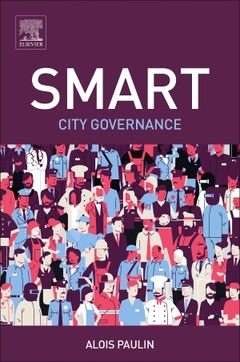Smart City Governance Smart Cities Series
Auteur : Paulin Alois

Smart City Governance examines public domain activities and services in the digital age, evaluating all facets of smart city e-governance that fosters a cohesive understanding for the emerging generation of advanced ?digital natives. Exploring the tensions between political science and jurisprudence theories with the principles of societies and their alignment with legal systems, the book examines how governance systems can translate into the digital domain, addressing both the technical and legal dimensions. It offers a model for the technological foundation of governance, discussing existing technological components. The book concludes with a section on outlooks for further research.
- Explores the development of sustainable governance by examining how public domain governance can leverage the full potential of smart city technologies
- Provides insights on the technical side of smart city governance
- Fuels discussions on how tomorrow’s urban public institutions can contribute to a more inclusive and participatory society
- Provides a system architecture blueprint based on the insights and lessons learned
Date de parution : 11-2018
Ouvrage de 304 p.
15x22.8 cm
Thème de Smart City Governance :
Mots-clés :
Ancient liturgy; Architecture design components; Architecture of nm-Gov registries; Authorization; Automation; Constellation-based reasoning; Corruption; Databases; Dependency on system administrator; Digital marketplaces; Digitalization vs informatization; Dynamic fine-grained access control; e-Democracy; Effect on economy; e-Government; Electronic identity; Electronic registries; Emergence of governance; Failure of law to regulate technology; Fair non-repudiation; Fallibilities of bureaucratic governance; Founding myths; Four generations of control by technology; Freedom of information; General purpose technology; General-purpose technology; Governance (definitions); Governance (technical view); Government as a platform; Government vs public apparatus; History of bureaucracy; Hohfeld’s analysis of jural relations; Identification; Informatization vs digitalization; Informatizing jural relations and statuses; Interpreted reengineering; Jellinek’s system of subjective public rights; Jural subjectivity; Key:lock paradigm; Legal certainty; Liquid democracy; Mechanization; Monopolization; Myths; Nonmediated determination of eligibilities; Nonpredictable context; Open government data; Open innovation; Parliamentary decision-making; Perpetuation of bureaucracy; Pirate party; Popitz’ thought experiments; Public apparatus; Public-key infrastructures; Quantum budget; Run-time limitations; Secure SQL server; Self-service determination of eligibilities; Semantic web; Signing; Smart city; Social contract theory; SQL query rewriting; Subjective public rights; System architecture; Techno-feudalism; Technological ecosystems; Timeless architecture; Transparent subject; Unfeasibility of traditional approaches; Unsustainability of e-government; Vendor lock-in; Virtual communal fund


